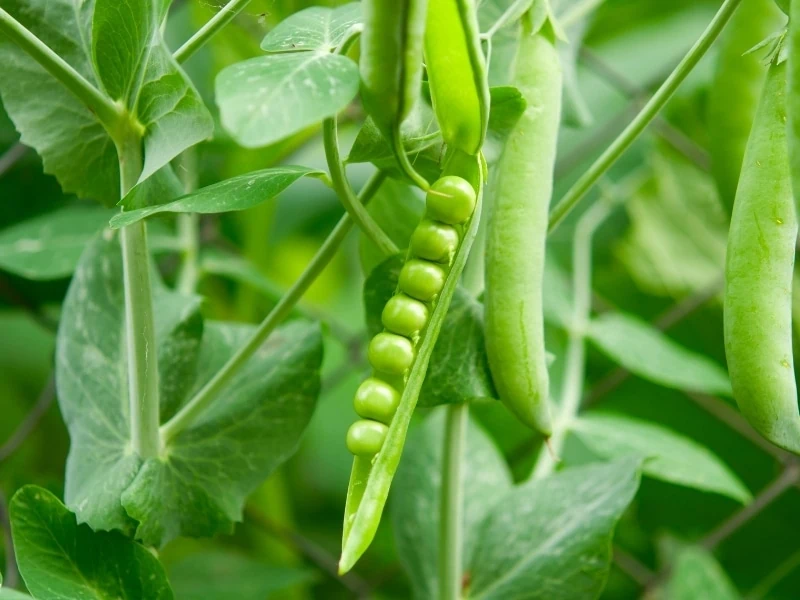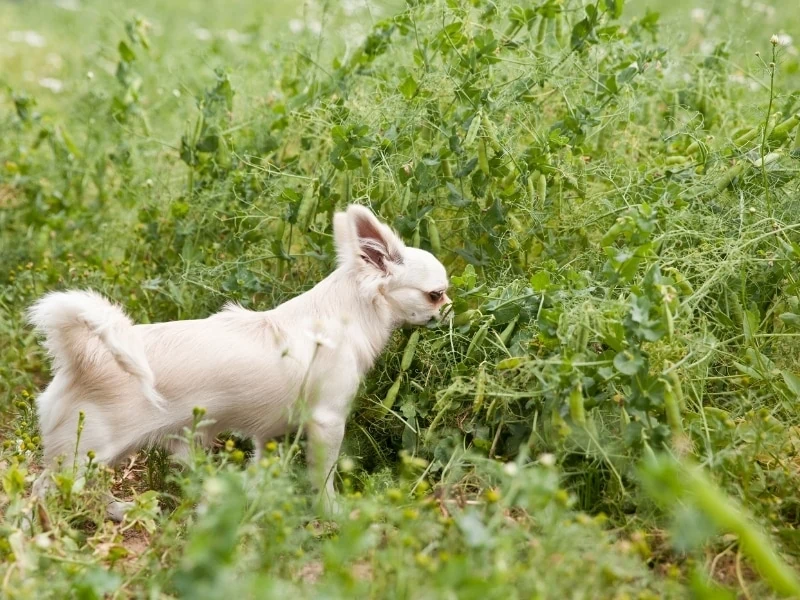Peas are a common ingredient in many commercial dog foods and even some recipes for homemade dog food call for peas. But what about fresh peas, are they safe for dogs to eat too?
So, can dogs eat peas? Yes, dogs can eat fresh, frozen, or cooked peas safely. In fact, peas are a great source of fiber that supports good digestion. They are also full of vitamins and minerals that can boost your dog’s immune system. However, dogs with kidney problems shouldn’t eat peas since they contain purine.
Keep on reading if you plan to feed peas to your dog! In this article, we’ll walk you through all the benefits and risks peas for dogs!
Are Peas Good for Dogs?
Dogs can eat peas safely as occasional treats combined with a complete and balanced diet. When we say peas, we are talking specifically about snow peas, sugar snap peas, and English peas, also known as garden peas.
Peas are a good source of fiber and they are also rich in protein, which is the main reason why they are often included in commercial dog foods. They are also full of vitamins A, K, and B6 and chock full of minerals like iron, zinc, potassium, and magnesium.
Including peas in your dog’s diet can have a positive effect on their overall health, improve digestion, and serve as a low-calorie treat!
Benefits of Peas for Dogs

The good news is that peas aren’t toxic to dogs and you can offer them to your pooch as occasional healthy treats. When fed in moderation, peas can offer many health benefits to your dog, including:
1. Peas Boost the Immune System
Peas are chock full of vitamin C, a powerful antioxidant involved in many functions within your dog’s body. Vitamin C is necessary for the growth, development, and repair of all body tissues and also supports wound healing.
But that’s not all! Vitamin C supports the proper functioning of the immune system, making your dog more resilient to diseases.
2. Peas Support Digestive Health
Peas are an excellent source of fiber which supports digestive health and fuels beneficial gut microbes. The larger part of this fiber is soluble, meaning that it may help mitigate constipation and make your dog regular.
3. Peas Promote Heart Health
Peas are a good source of heart-friendly minerals including potassium, magnesium, and calcium. They are also rich in antioxidants like vitamin C, and phytonutrients including carotenoids and flavonols which support cardiovascular function and protect the heart.
4. Peas Boost Muscle Growth and Strength
Fresh peas are also rich in potassium, an important mineral involved in many functions within your dog’s body. Besides promoting bone health and neural function, potassium is also essential for boosting muscle growth.
This mineral encourages the rapid growth of muscle cells which leads to stronger muscles. Potassium also helps muscles contract and relax which improves your dog’s motor skills (source).
Risks of Peas for Dogs
When fed in moderation, as occasional treats, peas are completely healthy and safe for most dogs. However, eating too many peas can cause more harm than good to your pooch!
The most common risks of feeding peas to dogs are:
1. Digestive Upset
Like any other new food, eating peas can result in vomiting and diarrhea in some dogs. In most cases, dogs that aren’t used to eating high-fiber foods experience digestive problems after eating a larger amount of peas.
To prevent tummy issues, start slow and only feed a small number of peas to your dog. If your pooch seems fine, gradually increase the number of peas you’re feeding.
2. Kidney Problems
Dogs with pre-existing kidney problems shouldn’t eat peas at all! Peas contain purine, a naturally occurring chemical compound that is also found in some human foods and drinks.
Purines produce uric acid which is filtered through the dog’s kidneys. Too much uric acid can cause kidney stones and other kidney problems which can be particularly dangerous for dogs with weakened kidney function.
3. Choking Hazard
While peas on their own can be easily chewed and swallowed without posing any risk of choking, pea pods are a completely different story. If you decide to feed garden peas to your dog, they must be shelled first!
Peapods can easily get stuck inside your dog’s throat and cause choking, especially in small breed dogs, or pups that gulp their food without chewing it first.
If your dog manages to get their paws on some unshelled peas, observe them closely! Call your vet right away if your dog exhibits any symptoms of choking like pawing at the mouth, coughing, gaging, or salivation (source).
How Much Peas Can a Dog Eat?
Always consult your vet before feeding any new foods to your dog! Since all dogs are individuals your vet will know how much peas you can feed to your dog based on their unique dietary needs.
As a general rule, small breeds should eat a teaspoon of peas a day. For large breeds stick to a tablespoon of peas a day to prevent digestive upset and flatulence.
If your pooch hasn’t eaten peas before, feed them only one or two to see how they react and whether they will experience any side effects.
How to Feed Peas to Your Dog?
There are many different ways you can feed peas to your dog, just make sure to shell them first! Also, avoid feeding canned peas to your canine companion, as most contain too much sodium, which is harmful to dogs.
Popular ways to feed peas to dogs are:
- Offer fresh peas as a tasty treat
- Add a spoon of raw peas to your dog’s kibble
- Puree cooked peas and mixed them with dog food
- Make homemade dog treats using peas, one egg, rosemary, and wholemeal flour
- Feed frozen peas as a refreshing summer treat
Conclusion
Besides being safe for dogs to eat as treats, peas are also very nutritious and delicious. These green legumes are loaded with antioxidants, vitamins, and minerals that boost your dog’s immune system and may offer protection against chronic diseases.
Don’t forget that dogs who suffer from kidney issues shouldn’t eat peas since they contain purine which can lead to kidney stones. Also, don’t feed shelled peas to your canine sidekick since shells pose a choking hazard.
Related Articles:


0 Comments